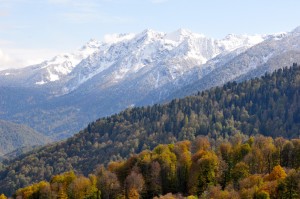Last Friday night, the world turned its eyes to a small town on the eastern coast of the Black Sea; the Sochi 2014 Olympics had begun. With opening ceremonies full of winter wonder, and the promise of a brave new world from International Olympic Committee (IOC) President Thomas Bach, Russia ushered in the next iteration of winter competition.
Though mired in controversy regarding the overrun of this Olympics (it is expected to cost roughly 50 billion Euros in total, by comparison Vancouver 2010 cost about 5.5 billion Euros), quietly shuffled aside are the concerns raised over the environmental impact.
To construct the Olympic venue for Sochi 2014, an area encompassing 8,750 acres of wetlands within the Sochi National Park has been effectively demolished. Though this area represents roughly 1.8 % of the total park size, it remains a sizeable portion to be lost. During the bidding process, Russia assured a zero-waste games and promised to follow Green standards. While this looks good on paper, zoologist Suren Gazaryan says “Sochi organizers have failed on all Green promises”. Gazaryan asserts he has witnessed not only illegal dumping of waste material, but also the blocking of major migration routes of animals residing within Sochi National Park; the park itself represents an extremely productive ecological area home to over 65 species of bird, none of which have been seen recently around Sochi.
All of this begs the question: Just how stringent is this concept of Green? It shouldn’t be a surprise that an undertaking of this magnitude will needlessly (as many other locations possess the infrastructure to support international games) require substantial environmental sacrifices. In spite of this, the IOC gave the go ahead to Russia in the face of their fabled ‘no-waste games’ concept. While Russia admittedly maintained their lofty ideal of planting three trees for every one that they cut down during the construction of Sochi 2014, Gazaryan makes the keen observation that “…ecosystems are not Lego sets that you can take apart and rebuild somewhere else”.
For the next two weeks the world will come together to celebrate the best of human triumph, but in the face of glory and prestige have we lost sight of the Green standard we hold ourselves so fervently to? During the opening ceremony, IOC President Thomas Bach implored us all to embrace our diversity; let us not forget that if we are to attain that brave new world, we must also embrace our biodiversity.
















